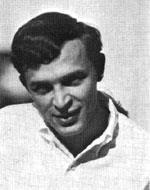Bina, Uri (Uriel)
Son of Sasson, who was born in Iran and immigrated to Israel, and Rivka (nee Shoshani), who was born in Jerusalem. He was born on December 4, 1942, in Jerusalem. In his early childhood he lived in Jerusalem and later in Tel Aviv, where he attended the Yavneh elementary school and the seventh high school in Jaffa. Dedicated to his family. As an older brother, he bore responsibility for his younger brothers, especially the younger brother, who was born when Uri was sixteen. He was fascinated by his stories and sharing them with his experiences, especially those connected with his youthful hobby, building and flying gliders. This hobby came to reveal his love for flying, which was evident from a young age. He was trying to build model airplanes on his own, and when he grew up he joined the Aerobatics Club, and in that framework he flew gliders. When he joined the IDF in October 1960, he joined the Israel Air Force and became a pilot. As part of his reserve duty, he underwent a retraining course for the Seahawk in which he flew during the War of Attrition and during the Yom Kippur War. Shortly before his fall he prepared to fly in Kfir. Uri’s love for Letis was one aspect of his character. Another aspect that stood out was the sense of responsibility for the human issue. The matter of the safety of people was very busy, he even wrote a special job on the subject, for the El Al company in which he worked in his civilian life, but he did not finish it. During this period, he worked concurrently to expand his education: he studied political science and economics at Tel Aviv University. Received a degree in political science, and after his death received a degree in philosophy. On 28 Iyar 5738 (4.6.1978) he fell in the Jordan Valley, while carrying out his duties. He was laid to rest in the military cemetery in Kiryat Shaul. Survived by his parents, two brothers and a sister. In a letter of condolence to the bereaved parents, his commander wrote: “… We relied on him, and it was clear that a task he would undertake on his own would perform very well.”
